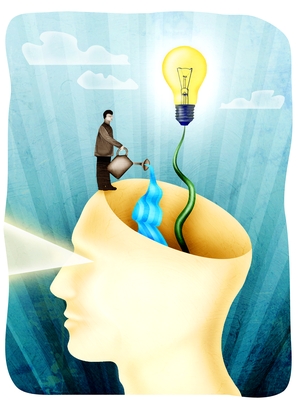How Your Process of Creating Stories Can Be More Creative

So... you want to write or tell stories? Fantastic. But how can you ensure that your writing or telling is as creative as possible and not just the "same old, same old?" What follows is a list of 20 tips to keep you operating at the highest octave of your creative potential:
1. Identify what blocks your creativity: When Michelangelo was asked how he made his iconic statue, The David, he explained, "I simply took away everything that wasn't." From his point of view, the statue was already in the stone. All he had to do was remove what obscured it. What is in your way of telling or writing your stories? What can you do, this week, to remove this clutter?
2. Immerse: Creative people have a unique ability to dive in and stay with a project for long stretches of time. They don't just hit and run. Instead, they get absorbed. That's why Einstein once said, "It's not that I'm so smart. It's just that I stay with problems longer." How can you make more time to really dive into your storytelling project?

3. Reframe failure: Creative people are less afraid of making mistakes than most people. They understand that many experiments are needed and that trial and error comes with the territory. When Thomas Edison was asked how it felt to fail 800 times before coming up with tungsten as the filament for the light bulb, his reply said it all: "Fail? I didn't fail once. I learned 800 times, what didn't work." How can you create more "storytelling experiments" in your life?
4. Go beyond your limiting assumptions: Often, the suppositions we make at the beginning of a project are completely bogus -- a strange concoction of our past experiences, false beliefs, and personal myths. Innovators have a knack for being less bound by limiting assumptions than most people. Their state of open-mindedness allows them to explore bold, new territories. What is your biggest limiting assumption about being a storyteller? What can you do to go beyond it?
5. Stay inspired: I know of very few depressed or despondent people who are consistently creative. And while it's true, that creative people can sometimes get depressed or despondent, they don't stay in that space for very long, realizing that a positive mindset is one of the keys to their success. What is the simplest way you can stay inspired as you proceed with your storytelling project?
6. Ask WHAT IF: Asking powerful questions is a great way to enter into a creative mindset, one that is infused with curiosity. And of all the questions you can ask, asking "What if?" is the most powerful. What if you weren't afraid to fail? How would that affect the choices before you? What are three other "what if" questions you might ask yourself?

7. Make connections between seemingly disparate elements: One of the qualities of a creative thinker is the ability to synthesize -- to see new relationships between this, that and the other thing. MTV, for example, is nothing more than the result of someone seeing a new connection between music and television. Drive-in banking? A new connection between cars and banks. What new connections can you make between seemingly unrelated elements of your project? List all the elements of it, then look for intriguing new connections between them.
8. See through others' eyes: One of the biggest obstacles to creativity is our odd little habit of viewing everything through our own eyes/lenses/filters. Addicted to our own point of view, we develop a weird kind of tunnel vision. The simplest way to free your self from this constraint is to look at your storytelling project through the eyes of someone else. How would Mohammed proceed if he was in charge? Rosa Parks? Richard Branson? Lady Gaga? What clues about proceeding do get from their approaches?
9. Pay attention to your subconscious mind: Ideas come to us from two places: the conscious mind (i.e. brainstorming, thinking, planning) and the subconscious mind (i.e. dreaming, intuition). Most great ideas seem to come to people from the subconscious mind, when they are taking a break from the problem at hand and not trying so hard. Where and when do your best ideas come to you? How can you honor these ideas more than you currently do?
10. Suspend logic and linearity: Most of us are rational beings. Our default condition is logic and linearity. But there is another part of us, too -- the free thinker, the dreamer, the one who likes to play with possibilities, often called "right brain thinking". How can you suspend your tendency to allow logic and linearity to dominate your life? How can you make more time to play around with possibilities?
11. Trust your instincts, intuitions, and hunches: Albert Einstein once said, "Not everything that counts can be counted; and not everything that can be counted, counts." Indeed, when he got stuck, he used to conduct what he called "thought experiments", a fancy name for daydreaming. Bottom line, he trusted his hunches more than most of us do. What are your instincts and intuitions telling you about your emerging storytelling project?
12. Entertain the fantastic: Gary Kasparov, the former Soviet Union Grand Chess Master, had the ability to strategize 26 moves ahead. But when, in 1989, he was asked what enabled him to beat Big Blue, IBM's mainframe computer, in a two game chess match, he attributed his success to "the ability to fantasize". Einstein, too, was a big proponent of fantasizing and once said "the ability to fantasize has meant more to me than my ability to absorb positive knowledge." How can you make more time, in your life, for blue sky thinking?
13. Collaborate: Some people assume that creativity is the result of a lone wolf genius inhabiting an ivory tower and returning to the "marketplace" with a brilliant breakthrough. And while this sometimes happens, it is mostly a myth. Often, creativity is sparked by being in relationship with other people -- jamming, brainstorming, and playing around with new ideas. How can you increase the amount of creative collaboration in your life? Who, specifically, can you invite to be one of your collaborators?
14. Have more fun: This just in! "Aha" and "Haha" are very much related. In the aha moment, the person with the insight ends up surprised about a given outcome. He/she is "dislocated" from their common assumptions, i.e. Archimedes in the bathtub. The haha moment is similar. Indeed, the reason why most of us laugh is because our expectations get disrupted. Creativity and humor are joined at the hip. Get too serious and you diminish the odds of creativity flourishing. In what ways can you infuse your creative process with more playfulness and humor?
15. Look for happy accidents: Do you know what penicillin, Post-It Notes, and Velcro have in common? They were all the results of accidents in the lab. None of them were the result of a brainstorming session or strategic plan. But instead of being dismissed as mistakes, the innovators associated with these discoveries, got curious. They played around with these unanticipated occurrences until they discovered their commercial value. Indeed, research indicates that 75% of all product and service breakthroughs are the results of serendipity, surprise, and happy accidents. What curious insights have you stumbled upon recently that the logical part of your mind may have dismissed as inconsequential?
16. Change environments: Sometimes, the simplest way to spark creativity is to change environments. Socrates knew this. That's why he invented his "Peripatetic School of Education" -- a way to get his students to walk the talk. This is why so many of us get our best ideas during or after exercising. Where can you go to refresh and renew yourself whenever you are feeling stuck?
17. Be comfortable with ambiguity: Creating something new is not a function of a predictable, sequential process. It often requires lots of time spent not knowing or being confused. Ambiguity comes with the territory. If you are not mindful of this phenomenon, you will likely grab onto the "first right idea" to settle yourself down. This is not a good idea. In what ways can you give yourself more permission to be uncomfortable as you proceed with your storytelling project?

18. Acknowledge your progress: Creating something new is often frustrating. Results don't always come quickly. Consequently, aspiring innovators tend to get discouraged and enter into a cranky mindset. Inspiration, optimism, and positivity go out the window. The simplest way to neutralize this phenomenon is to take a few minutes at the end of each day to acknowledge the progress you have made, no matter how small. Think about your emerging storytelling project. What progress have you made on it today? This week? This month?
19. Give and receive feedback: Often, aspiring innovators are on the right track, but their addiction to "being right" gets in the way. What they need to do in order to open up their creativity is get feedback from people they trust. Unfortunately, this happens infrequently. All too often, we interpret feedback as criticism, so we don't ask for it. In what ways can you get more feedback about your storytelling telling project? Who can you ask today?
20. Honor your polarities: People who want to be more creative, would love there to be some kind of blueprint or map. Guess what? There isn't And even if there was, it would include lots of contradictory directions. That's because the act of "being creative" is often a contradictory process, which is why Niels Bohr, the Nobel-prize winning physicist, once said: "Now that we have met with paradox, we have some hope of making progress." The creative process is not an either/or phenomenon. It is both. Which of the following polarities do you toggle back and forth between?
-- Patience/impatience
-- Solitude/collaboration
-- Urgency/relaxation
-- Seriousness/playfulness
-- Divergence/convergence
What other polarities do you experience in your creative process? What can you do to honor them more than you currently do?
Excerpted from my forthcoming book, to be published in May.
MitchDitkoff.com
My storytelling workshop
Post a comment
Thanks for signing in, . Now you can comment. (sign out)
(If you haven't left a comment here before, you may need to be approved by the site owner before your comment will appear. Until then, it won't appear on the entry. Thanks for waiting.)







 If you like this blog, you might also like Mitch's other two blogs:
If you like this blog, you might also like Mitch's other two blogs: 